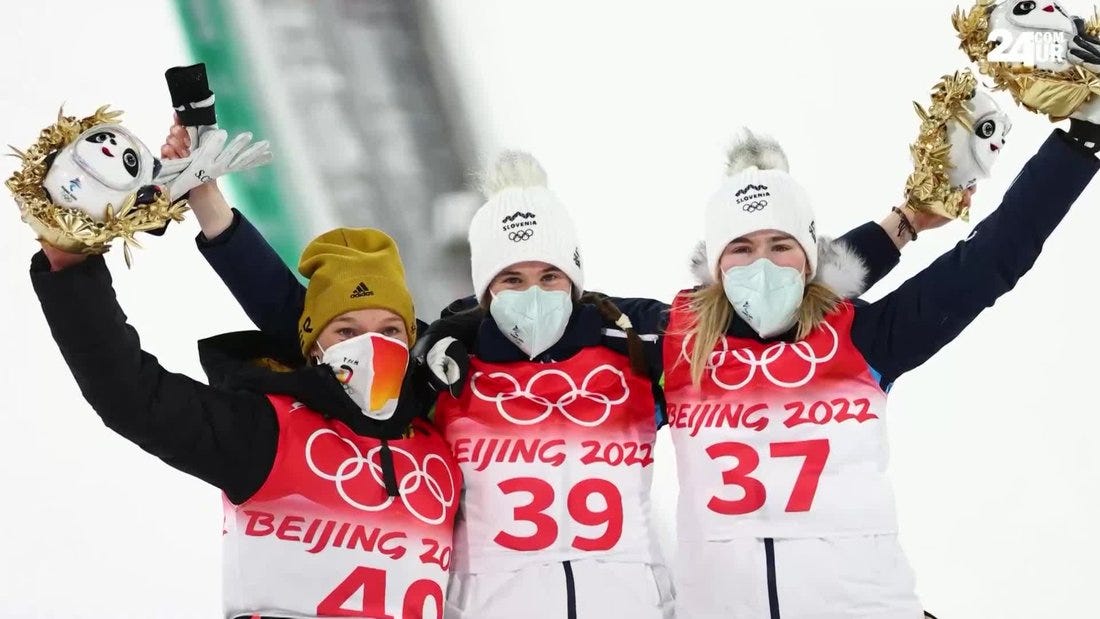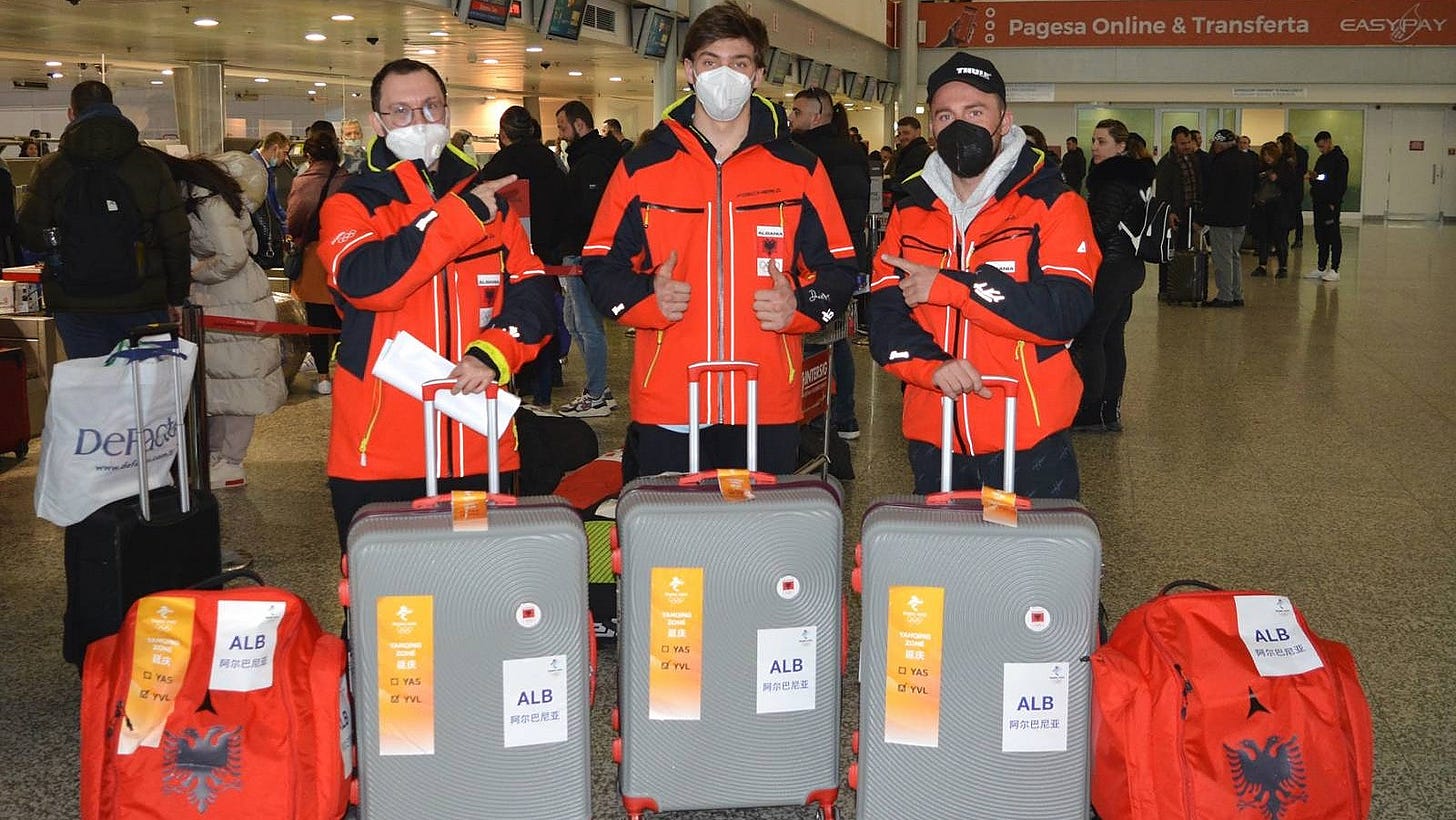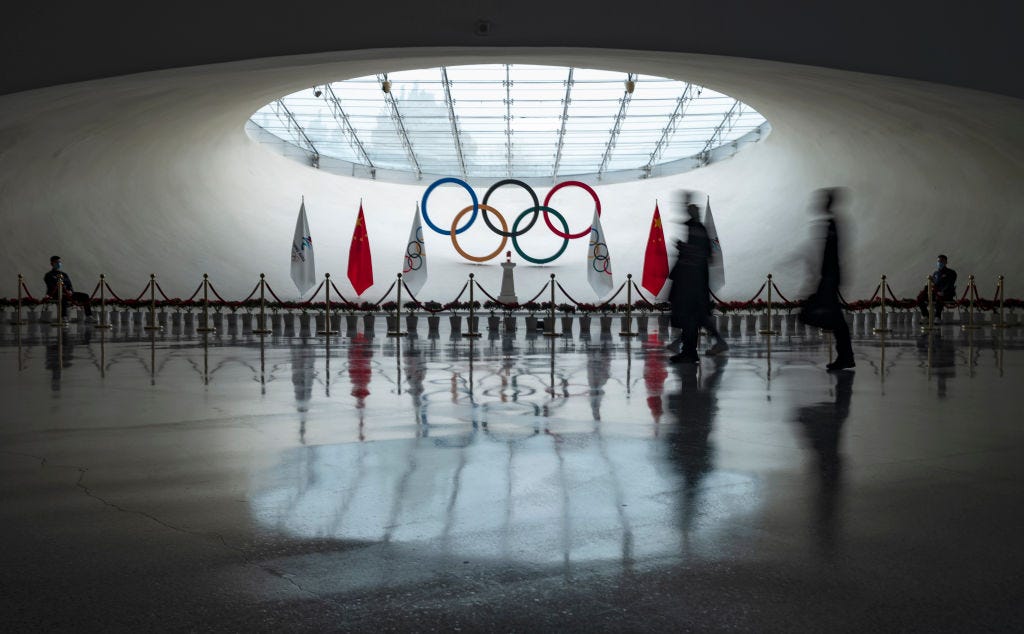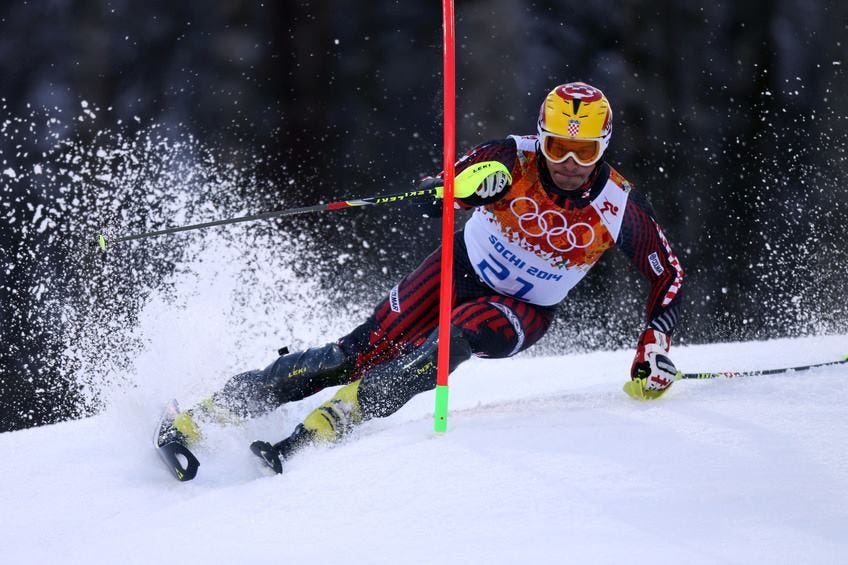S2E27. Dreams of glory
The Balkan athletes' experience at the Beijing 2022 Winter Olympics: new historical records, high hopes for the next editions and a long road to success
Hi,
welcome back to BarBalkans, the newsletter (and website) with blurred boundaries.
You may have noticed that last week no newsletters arrived in your mailbox.
Don’t worry, it was not a technical issue.
As I explained you in the last stop (here, if you want), BarBalkans has become a biweekly newsletter, because a new parallel path has begun.
Every other Saturday, when you do not receive this newsletter, I invite you to visit barbacani.eu, to read the new in-depth analysis of “The Langer-Sassoli Project”.
The first chapter was published last week. It is titled Lives spent at their best, it analyzes the biographies of Alexander Langer and David Sassoli, and you can read it at this link.
So, if you are reading the usual BarBalkans newsletter today, the second post of the Langer-Sassoli notebook will be out next Saturday. Now you know where to find it!
Also read: S2E23. Farewell, Mr. President
Well, now we can start again.
We do it with the Balkan athletes’ experience ar Beijing 2022 Winter Olympics, which will end tomorrow (February 20).
What happened
With still a few medals up for grabs, the outcome of the Balkan athletes is 2 golds, 3 silvers and 2 bronzes.
Or rather, it would be better to say the outcome of Slovenia, the only delegation to win medals in this edition of the Winter Olympics (the same happened four years ago).
A total of 72 athletes took part, 37 men and 35 women. More than half were Slovenians (44).
Only one Albanian athlete went to Beijing and the other countries also struggled to qualify: Kosovo and Serbia (2), North Macedonia and Montenegro (3), Bosnia and Herzegovina (6) and Croatia (11).
As for Tokyo 2020 Summer Olympic Games, gender equality was almost achieved: one delegation was women’s majority (Croatia) and three in equal number (Bosnia and Herzegovina, Kosovo and Serbia).
These 72 athletes competed in 8 different sports categories, with a clear dominance of cross-country and alpine skiing.
Although, paradoxically, the largest number of medals was won in ski jumping (4, including 2 golds, 1 silver and 1 bronze).
If you want to know all their names, just look at the BarBalkans’ Instagram story highlights, dedicated to Beijing 2022.
Enthusiasm
In short, let’s say that the positive aspects of the Western Balkans’ athletes experience in Beijing are not related to the number of medals won.
This is true for all the delegations, except - obviously - for Slovenia.
For Ljubljana this was one the most successful edition in its history at the Winter Olympic Games, which began in 1992.
The record was established in Soči 2014: 2 gold, 2 silver and 4 bronze medals. However, at that edition the Slovenian delegation counted a third more athletes (66), in 8 different disciplines.
Eight years later, Slovenia won 7 medals, but with fewer athletes in fewer sports (6).
A great improvement compared to Pyeongchang 2018, when 71 athletes (in 9 sports) filled the medal table with just 1 silver and 1 bronze.
The snow lion’s share has gone to ski jumping, thanks to the team competitions (mixed and men) and the historical performance in the women’s normal hill: Urša Bogataj and Nika Križnaron got on the highest and the lowest step of the podium with the Slovenian flag.
The other medals came from the snowboard parallel giant slalom (men’s and women’s) and the alpine skiing giant slalom.

Apart from the medals, there are also other aspects that have made this edition of the Olympic Games somehow historical.
For example, it is certainly true for Kosovo.
This was the second edition of the Winter Olympics in the this country’s history, and the first time a female Kosovar athlete participated in the Winter Olympics.
Her name is Kiana Kryzeiu, she is a skier and is not yet 18. Although she did not win any medals, she has already made history.
As well as her only delegation partner, Albin Tahiri, also a skier. In 2018, he was the first Kosovar athlete ever participating at the Winter Olympics and this year he did an encore with another memorable qualification.


Frustration
Except for the historical first times, there is bitterness for many delegations that have still never got on the podium in their own history at the Winter Olympics.
In addition to Kosovo, there is also Albania, Bosnia and Herzegovina, Montenegro, North Macedonia and Serbia.
Each of these countries has made its debut in different editions - Serbia and Montenegro did not even make it together between 1998 and 2006 - and in Beijing 2022 they failed to break this frustrating tradition.
Read also: S2E1. Back from Tokyo 2020
Nevertheless, it has to be said that the frustration might be handled differently between Balkan countries.
For example, if we consider the age of the athletes who participated in the competition in these two weeks.
Thanks to an effort of their respective National Olympic Committees, Albania and Montenegro could grow some interesting sporting movements around promising young athletes who were in Beijing.
Albanian skier Denni Xhepa was born in 2003, while the 3 Montenegrins competing in cross-country and alpine skiing - Eldar Salihović, Jelena Vujičić and Aleksandar Grbovic - are between 18 and 22 years old.
The same cannot be said for the other delegations, which will have to find fresh energy to renew themselves and to aim at new achievements in the next editions of the Winter Olympics.

A final consideration has to be made about Croatia, the greatest disappointment among the Balkan countries at Beijing 2022.
With 11 athletes - including 6 in alpine skiing and 3 in cross-country - there was a good opportunity to break a negative record that has been going on since 2014.
Back then, Ivica Kostelić won a silver medal in alpine skiing. We have to go back 20 years for the greatest Croatian performance: 3 golds and 1 silver, thanks to a delegation slightly larger than this year’s (14).
The dreams of glory in the Western Balkans remain.
The road to reach them seems a large sheet of ice.
Pit stop. Sittin’ at the BarBalkans
We have reached the end of this piece of road.
Today, at our bar, the BarBalkans, we take a step into the past, as always with the Olympic Games.
In this occasion our favorite beer is the ‘84 Olympics APA, brewed by ‘84 Olympics Craft Brewery, based in the Bosnian capital city.
This is a beer that takes us back almost 40 years, to the Sarajevo 1984 Olympic Winter Games, when Yugoslavia was still a united Federation.
While sipping this American Pale Ale, we remember the past and continue to dream about the future of sport in the Balkans.
Let’s continue the BarBalkans journey. We will meet again in two weeks, for the 28th stop.
Don’t forget the second analysis in the Langer-Sassoli Project notebook, on barbalcani.eu next Saturday.
A big hug and have a good journey!
Did you like this newsletter? Forward it to someone you think might be interested in!
BarBalkans is a free newsletter. Behind these contents there is a lot of work undertaken.
If you want to help this project to improve, I kindly ask you to consider the possibility of donating. As a gift, every second Wednesday of the month you will receive a podcast with an article about the dissolution of Yugoslavia.
Every month you can listen to the preview of BarBalkans - Podcast on Spreaker and Spotify.
Pay attention! The first time you will receive the newsletter, it may go to spam, or to “Promotions Tab”, if you use Gmail. Just move it to “Inbox” and, on the top of the e-mail, flag the specific option to receive the next ones there.
As always, I thank you for getting this far with me. Here you can find all the previous newsletters.







